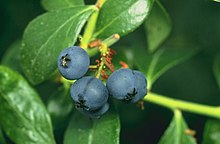
Back Blǣwenberge ANG توت أزرق Arabic توت ازرق ARZ ব্লুবেরি Bengali/Bangla Cyanococcus Catalan Blåbær Danish Kultuurmustikas Estonian سیاه گیله (گونه) Persian Bláber Faeroese Bleuet (fruit) French
| Blueberry | |
|---|---|

| |
| Vaccinium caesariense | |
| Scientific classification | |
| Kingdom: | Plantae |
| Clade: | Tracheophytes |
| Clade: | Angiosperms |
| Clade: | Eudicots |
| Clade: | Asterids |
| Order: | Ericales |
| Family: | Ericaceae |
| Genus: | Vaccinium |
| Section: | Vaccinium sect. Cyanococcus Rydb. |
| Species | |
|
See text | |

Blueberries are a widely distributed and widespread group of perennial flowering plants with blue or purple berries. They are classified in the section Cyanococcus within the genus Vaccinium.[1] Commercial blueberries—both wild (lowbush) and cultivated (highbush)—are all native to North America. The highbush varieties were introduced into Europe during the 1930s.[2]
Blueberries are usually prostrate shrubs that can vary in size from 10 centimeters (4 inches) to 4 meters (13 feet) in height. In commercial production of blueberries, the species with small, pea-size berries growing on low-level bushes are known as "lowbush blueberries" (synonymous with "wild"), while the species with larger berries growing on taller, cultivated bushes are known as "highbush blueberries". Canada is the leading producer of lowbush blueberries, while the United States produces some 40% of the world's supply of highbush blueberries.
- ^ Lisa J. Rowland; Freddi A. Hammerschlag (2005). Richard E. Litz (ed.). Vaccinium spp. (8.1: Blueberry). In: Biotechnology of Fruit and Nut Crops: Volume 29 of Biotechnology in Agriculture Series. CABI. ISBN 0-85199-066-5. Archived from the original on December 12, 2020. Retrieved September 21, 2020.
- ^ Cite error: The named reference
nauman1993was invoked but never defined (see the help page).